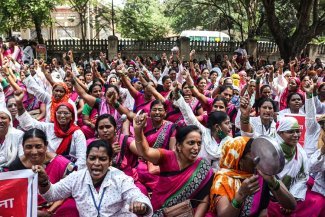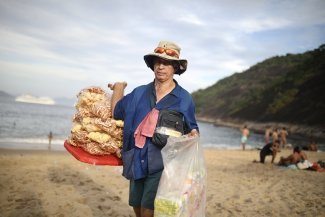“We decided, my friend and I, to go with a guide into the jungle from Iquitos, in Peru, to Brazil, to study the plants. We had been walking for six days and we were exhausted. My friend was injured and could hardly walk. Our guide went to look for help from the Matsés. They treated us with plants, with their ancestral knowledge, without asking us for anything in return.”
It was this adventure, in 2003, that inspired William Park to try and help the Matsés by founding the Acaté Amazon Conservation NGO.
Equal Times met up with him just a few months after he had completed a project of mammoth proportions: a 500-page encyclopaedia compiling, in collaboration with the community, a large portion of their medical knowledge.
There is only one copy of the document, written in the language of the Matsés.
“The aim is to help the community to preserve and pass on their knowledge without it being pillaged by foreign businesses. If they decide to share it one day, that is their choice. It isn’t up to us to decide for them,” explains the specialist in sustainable agriculture.
It represents a radical change in societies where the transmission of knowledge is almost exclusively oral.
“We asked them what they needed. The transmission of knowledge was the most important thing for them,” continues the American, who now lives in Iquitos.
Transmission of knowledge to the next generation
Part of this knowledge is relatively straightforward: how to find a source of fresh water in the middle of the jungle by cutting a vine, how to put your hand on an ant hill and use ants as mosquito repellent, how to heal a wound using Dragon’s Blood sap, etc. Such knowledge is acquired at an early age in the communities, being the keys to everyday survival in a seemingly hostile environment.
But the more complex aspects of indigenous knowledge are often at risk of extinction.
Marcelinho, a shaman living in a community that is a four-hour drive from Iquitos, tells Equal Times: “In my family, the shamanic tradition is passed on from father to son but, even so, knowledge is lost.”
“Everything, from the smallest infection to cancer, can be healed with the plants we find in the jungle. Doctors from outside our community don’t believe us and advise people not to come and see us.”
Although the veracity of such miraculous cures is as yet to be proven, pharmaceutical companies are actively seeking new products. Plants found to be effective from a “western” perspective are tested and very often patented by multinationals.
The Development Bank of Latin America published a report in 2005 aimed at addressing this worrying trend.
Its authors highlighted the profound imbalance between the biodiversity found primarily in the South and the fact that 95 per cent of world’s patents are held by companies from the North.
“If three communities use the same plant for the same illness, a bio-prospecting firm will test it,” explain the authors.
The appropriation and then standardisation of this traditional knowledge, coupled with the attraction of many young indigenous people to the big cities, is making the transmission of ancestral knowledge increasingly difficult.
To fight this situation and preserve the traditional way of passing on knowledge, Acaté is helping to establish a system of learning whereby an “elder” takes charge of passing on knowledge to a young member of the community.
Such guidance is indispensable, according to Arquimedes Vitonas of the Nasa people from Cauca in southern Colombia.
This indigenous rights specialist, recognised as a “Master of Wisdom” by UNESCO in 1997, explains: “It is a widespread problem. Knowledge is transmitted orally and if the young people do not wish to learn, the elders do not always insist. When they depart, the knowledge is lost, because it is usually the kind of knowledge that is difficult to put down in writing.”
Milagros Paz Zegarra, the new officer in charge of indigenous issues at the trade union centre Central Autónoma de Trabajadores del Perú (CATP), also points to the problem with education in the communities.
“The teachers who go to work in the communities often come from Lima. They don’t speak the language and don’t understand the importance of the community and cultural knowledge. The first peoples have much they could teach us about medicine, culture, the environment, and so on. We are in the process of losing this ancestral wealth. Things must change, by training people directly from the communities to become teachers.”
Such action has been taken in the Junin region in central Peru. The CAAAP (Amazon Centre of Anthropology and Practical Application) is working together with the communities to train young indigenous people as engineers, teachers, leaders, etc. The idea, according to Adda Chuecas, head of the CAAAP, is that “the Ashaninkas be the agents of their change. Thanks to this programme, young people are getting involved in the communities and are working in the administrations to able to defend the interests of their people.”
Digital solutions?
Population growth, loss of territory, environmental degradation, confrontation with the “modern world”, the reasons for the gradual loss of indigenous knowledge are numerous.
The solutions are less so, but digital technology is starting to occupy a growing place.
In Mexico, a group of experts have compiled an audio dictionary of the Wixaritari language, spoken by some 40,000 indigenous peoples.
In Brazil, the Tribal Voice project launched by Survival International this summer has given a voice to Guarani and Yanomami communities. The idea is to show the outside world what life is like inside the communities and the problems they have with illegal loggers or gold miners.
The Heritable Innovation Trust is working with communities across six different countries to protect the intellectual property of indigenous peoples. The organisation has developed a system for registering and protecting the communities’ cultural, linguistic or medical heritage as an inalienable right.
“Our work is to protect nature, the wind, the mountains, the forest, the animals, and that is what we want to teach you people.” The words of the Yanomami spokesperson and shaman, Davi Kopenawa, uttered in back in 1992, still ring true in the run-up to COP21 in December in Paris.









